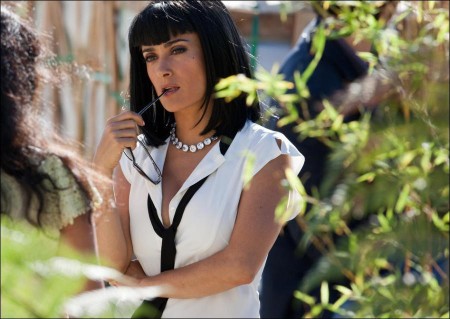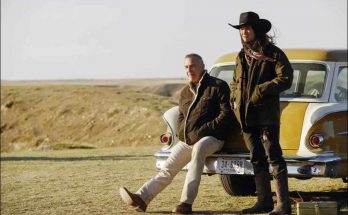From its provocative first chapter to its lyrical last page, Don Winslow’s audacious 2010 novel “Savages” captivated and stunned audiences and critics alike. Winslow describes that the genesis of his bestselling book was an unusual one: “I was sitting at my desk one day in a bad mood and I typed these two words, which would become the infamous first chapter of the book. Then I wrote 14 pages in a rush, and I e-mailed them to Shane [screenplay co-writer / executive producer Shane Salerno] and told him, ‘Either these are really good, or I’m just crazy.’ A few minutes later, I got an e-mail from him saying, ‘Drop everything else you’re doing and finish this book while you’re in this voice.'”
Winslow’s novel proved that rules are made to be broken, and he ended up crafting several chapters of ‘Savages’ in screenplay form. “I was trying to bust out of the typical confines of the crime genre as it’s been defined lately,” Winslow shares. “I threw a few elbows and found moments where I thought, ‘This is better read or experienced as a piece of film rather than as a piece of a novel.'”
Salerno, with whom the author has collaborated for more than 13 years, was glad that he had encouraged Winslow to focus his energy into revisiting a world that the author knew quite well. The executive producer explains: “Don wrote what a lot of people consider to be the definitive source on the subject with ‘The Power of the Dog,’ which is the story of the drug war over 30 years—from the formation of the DEA to 2005. He spent six years researching it down in Mexico, Texas and California. This is terrain that he has chiseled his name into, and it’s a world he knows so well. With ‘Savages,’ he was prescient in seeing the business move from the Mexican cartels into California. It’s interesting when real-life events start to mirror your worst fears.”
Not only was the book critically well received when it was published—Stephen King called the sexy, action-filled drama “Butch Cassidy and the Sundance Kid on autoload”—it was fast-tracked into a screenplay. Reflects Salerno: “The normal route for books, and certainly Don’s previous books, is to sell them straight to a studio. “We made the decision to do something different, and we optioned the book to Oliver Stone directly. We felt that this unique material wouldn’t benefit from traditional development, and it needed special handling. We felt that Oliver would get it and began a collaboration developing it and ultimately writing the screenplay together. From the time the script sold to the time that shooting began, it was about three months, which is unheard of.”
“Savages,” laced with the politics and trade of marijuana, areas that have long been of interest to the writer/director, riveted Stone when he read it in galley form. Shane Salerno & Don Winslow & Oliver Stone adapted the novel into a screenplay, and in less than a year, Universal Pictures secured the worldwide distribution rights. Soon after, principal photography began. Of his interest in crafting a film out of the groundbreaking novel, Stone relays: “I thought the book was well done. It’s about power, betrayal, money and questioning current values.”
Savages features multiple themes that recur in Stone’s movies: layered power struggles, shifting loyalties, examinations of the best and worst of human nature, explorations of complex family relationships and a compelling look at damaged people, some of whom find their own kind of heroism.
Stone reflects that this project called to mind Any Given Sunday and “the corporation coming into football.” About the economy of scale, he says: “Above all, it is a power move by the Mexican Cartel into the United States to cut in on the independent distributors and producers. In the movie, the Baja Cartel is more interested in volume than the boutique-sized operations. But wherever you have volume versus independent growers, you’re going to have a clash. Walmart doesn’t want to have competitors.”
Frequent Stone collaborator, producer Moritz Borman offers that there is a natural inclination to search for parallels in Savages with Stone’s earlier films, but that the director isn’t interested in retreads. Borman says: “Obviously, people will try to compare Savages to some of Oliver’s other movies, but the style and message are different, and it’s a different story. But it certainly has some of the intensity of his other pictures. He has always had something to say, and therefore has turned out these films that have survived.”
His fellow producer, Eric Kopeloff, notes that the director is as interested in characters as he is in a geopolitical backdrop: “That’s what excites him about making movies—finding a story where you can go on a ride with the characters. Oliver’s someone who never stops trying, never stops doing different things to stretch the medium.”
The translation of a lauded novel into an engaging movie is often an arduous one. For example, the film’s explosive ending, which Stone likens to a Spaghetti Western, captures the tenor of the book but doesn’t follow it to the letter. That divergence, Kopeloff notes, is part of the process of moving from one medium to another. He says: “There’s a liberty when you adapt a book into a screenplay, from a story perspective, from a time perspective. If we shot every scene in the book ‘Savages’ we would be easily sitting for five hours. We held true to the book in a lot of ways, but we also took cinematic liberties to heighten the story in certain places and give the audience a visual and character ride.”
Winslow expands upon the differences in penning a novel versus a screenplay: “Primarily, as a novelist, you have to become aware that, at the end of the day, these are two different media with a lot of different needs, and that can take a little getting used to. For instance, a chapter in a book can accomplish just one thing, whereas a scene in a film has to accomplish two or three things simultaneously. Screenwriting is an extremely demanding artistic form that has to take so many factors into account at once.”
In the story, the Baja Cartel admires Ben and Chon’s product and process and wants to acquire their business. However, they disdain their lifestyle, especially their unorthodox relationship with O. On the flip side, Ben, Chon and O are as equally repulsed by the Cartel and their methods. At various points, as the contest between the Cartel and Ben, Chon and O becomes increasingly ruthless and violent; just who is the savage becomes blurry and subjective at best. Stone sums: “It’s ironic that both sides identify the other as savages.”
Visits: 104




